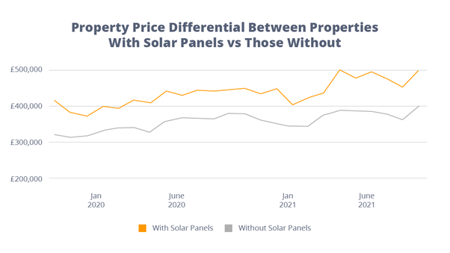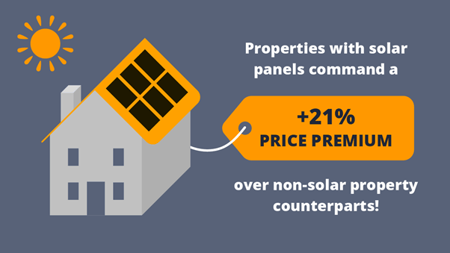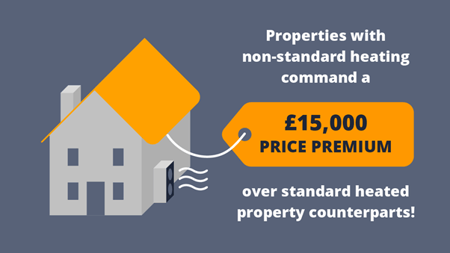As environmental issues progressively make the headlines, our awareness of eco concerns is ever-increasing. There's a focus on improving the energy efficiency of UK properties with the onus on owner-occupiers to make a change. Improving the EPC rating of existing dwellings via home improvements can reduce fuel bills and provide many benefits.
But does this really affect property value? What is happening in today's property market and which energy-saving measures will actually make a difference when it comes to buying and selling houses?
Does the EPC (Energy Performance Certificate) Rating Affect House Prices?
An obvious place to start this analysis is with the overall energy efficiency of properties. We can easily measure this using EPC ratings. Energy performance certificates (EPCs) are required for any property sale, so they immediately provide a standardised measure for comparison.
EPCs measure a property's energy efficiency and rate it on a scale of A-G. An energy assessor carries out this calculation taking a variety of factors about a property into account. This energy efficiency rating is clearly displayed on property listings, so there's no argument that clear energy labelling is available to prospective buyers in the UK market.
.png?width=450&name=energy-rating%20(002).png)
Related: Find out more about EPC Ratings.
Our Findings:
Surprisingly, we discovered that EPC rating does not affect property prices. Despite the impact on energy bills, our research suggests that homebuyers are not driven by this factor.
Here's a summary of our key findings on whether EPC rating affects house prices and market performance:
- Energy-efficient properties do not sell or complete faster than those with poor energy efficiency
- There is no price premium for an energy-efficient property, outside of an exceptionally small number of properties that are rated A
Although energy-efficient properties are slightly more likely to sell than their non-energy efficient counterparts, it seems that the energy performance certificate has only a modest influence on property sales.
In short, the energy rating of the property on average does not make a difference to demand, supply or prices.
This is good news for sellers with older properties, as it just goes to show that you can sell properties with the lowest energy efficient ratings with relative ease. But if the worst energy efficiency ratings aren't a deterrent for homebuyers, how does the market incentivise greater energy efficiency?
Energy Efficient Homes: Solar Panels
Whilst many energy efficiency improvements can be very effective, one of the most visible is the addition of solar panels. Sometimes the addition of solar PV (photovoltaic) systems can improve a home's EPC rating in itself, but in spite of whether or not it does this, it does improve home energy efficiency.
When solar panels are added, the home generates some of its own solar energy which will reduce energy bills. The benefits of solar panels are clear and tangible. So do solar panels increase home value?
When solar panels are added, the home generates some of its own solar energy which will reduce energy bills. The benefits of solar panels are clear and tangible. So do solar panels increase home value?
Related: Find out more about solar panels.
Our Findings:
We found that properties with solar panels do not sell or complete faster than those without. There are no significant differences in the likelihood that properties with solar panels will sell.
However, properties with solar panels do demand a price premium in the UK property market.

The graph above compares properties with solar panels and those without. There is a price premium of nearly £80,000.
What's more, this price premium is increasing. In the last twelve months, the average premium was around £86,000. During the twelve months prior to this, the average premium was closer to £71,000.

Once again, a central heating system will be assessed as part of the EPC rating. Operating a different heating system has the potential to improve energy efficiency. Low carbon heat pumps are part of a government drive to make all heating systems low carbon. The Clean Heat Grant scheme is set to offer a government grant to help replace gas boilers with heat pumps. Air source heat pumps are significantly cheaper than ground source, with the former retailing at between £4k-8k.
Our Findings:
- In today's market, property with non-standard heating takes 22 days on average (or 40%) longer to sell than their standard heating counterparts.
- Demand in September 2021 was 13% higher for property with non-standard heating versus standard.
- Over the course of the last two years, property with non-standard heating has commanded a £15,500 price premium, which is about 5%.

So, How do Energy Savings Increase the Sale Price of a House?
In today's market, overall EPC energy ratings have little impact on the sale price, likelihood or speed of a property sale. The only energy efficiency factor that will significantly increase a house price is the addition of solar panels. A non-standard heating system can demand a premium too, and demand seems to be on the increase.
This may be shocking to some, but the UK's housing stock accounts for around 15% of all carbon emissions in England. These Climate Change Committee figures suggest the housing market has a vital part to play in the UK's climate change obligations. If the government takes measures to encourage increased energy efficiency in future, this is sure to have an additional impact on property prices.
Related: Find out more about the Climate Change Committee and November 2021's COP26
For more information, or to learn more about our property market insights, then please contact Katy Billany, (Our Executive Director for Estate Agency Services) at katy.billany@twentyea.co.uk.




